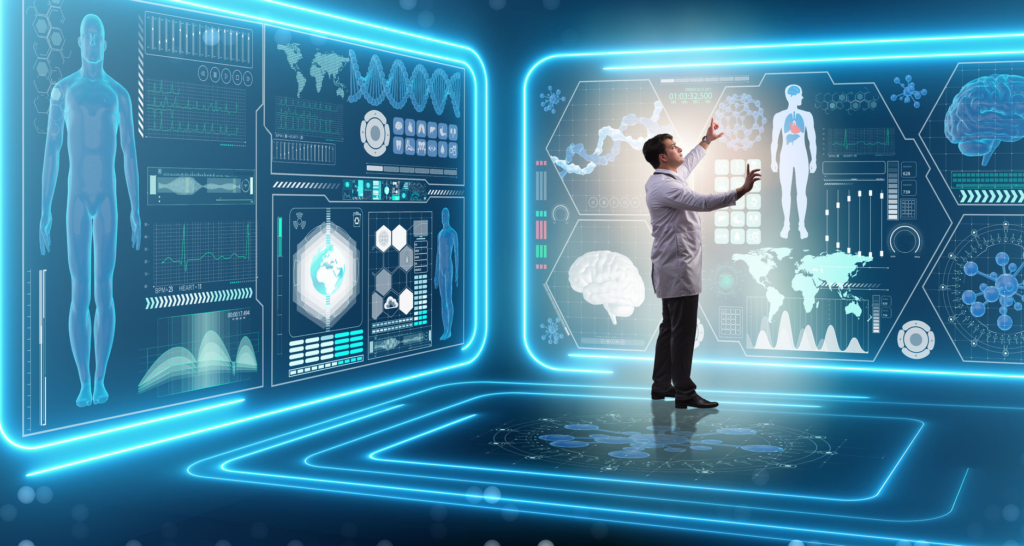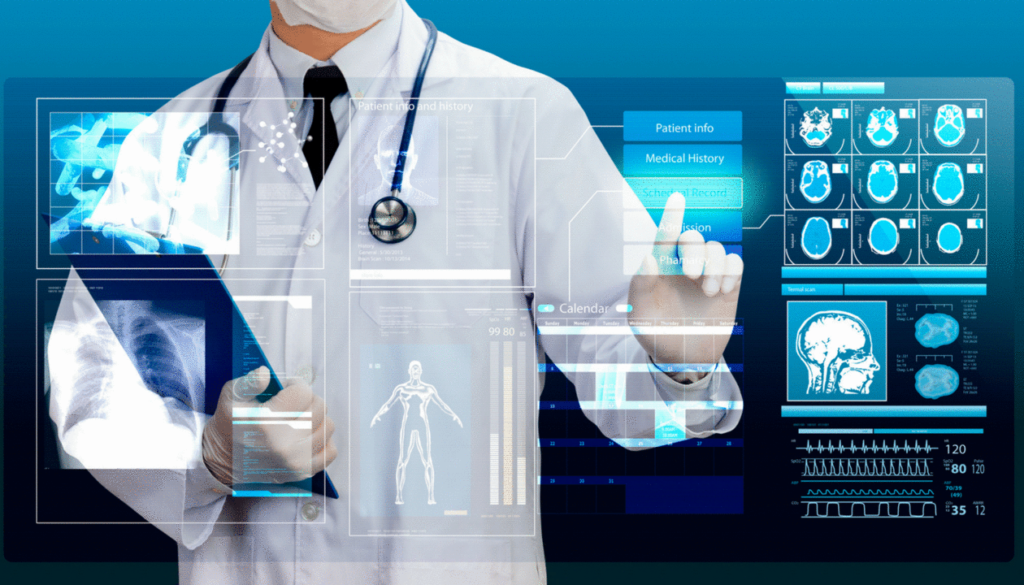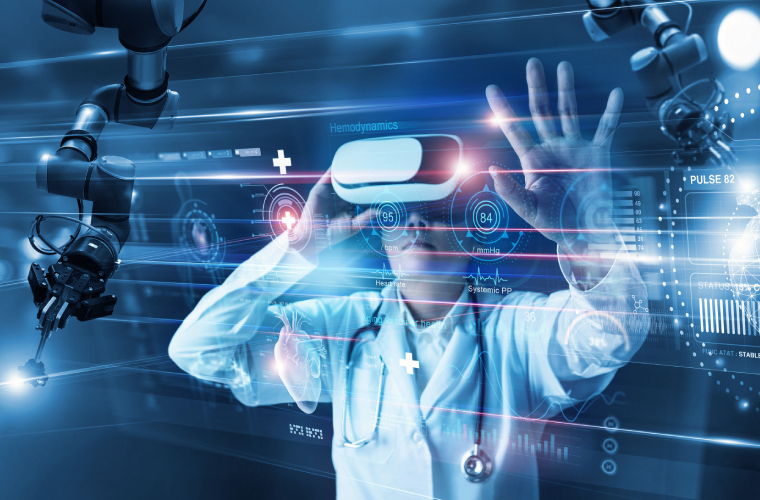The Impact of Artificial Intelligence on Healthcare: Transforming Patient Care and Medical Research
Artificial Intelligence (AI) is shaping the future of many industries, and healthcare is no exception. In recent years, AI has become a crucial tool in the medical field, offering innovative solutions that improve patient care, assist medical professionals, and streamline healthcare operations. This blog explores how AI is transforming healthcare and its potential for the future. By enhancing diagnosis, treatment, and research, AI promises to revolutionize the medical world.
AI in Diagnosis and Disease Detection
One of the most exciting uses of AI in healthcare is in disease diagnosis. With its ability to analyze large datasets quickly, AI can detect patterns that humans might miss. For example, AI systems can scan medical images like X-rays, CT scans, and MRIs to identify signs of diseases such as cancer or lung conditions.
Improved Accuracy and Speed
AI algorithms can process massive amounts of data faster than any human, leading to quicker and often more accurate diagnoses. For example, in radiology, AI tools have shown they can match or even outperform human radiologists in identifying abnormalities. This speed and accuracy can make a significant difference in patient outcomes, particularly in cases where early detection is crucial.
Transitioning from traditional methods to AI-powered diagnostics reduces human error and enhances the chances of catching diseases in their early stages. As AI technology continues to advance, its role in diagnostics will likely expand further, offering even more precise and rapid results.
AI and Personalized Medicine
Personalized medicine is another area where AI is making significant strides. By analyzing patient data, AI systems can help doctors design customized treatment plans that are specifically tailored to the individual. This marks a shift from a “one-size-fits-all” approach to a more precise, patient-centered method of care.
Tailored Treatments
Using genetic data and other health information, AI can predict how a patient might respond to specific treatments. For instance, AI can recommend the most effective drug for a cancer patient based on their unique genetic makeup. This reduces trial and error in treatment, saving time and improving outcomes.
Additionally, AI-powered wearable devices and apps allow patients to monitor their health in real time. These tools can track vital signs, blood sugar levels, and more, helping individuals manage chronic conditions more effectively. The data from these devices can be analyzed by AI algorithms, providing both patients and doctors with insights that lead to better decision-making.
AI in Medical Research and Drug Development
AI is not only transforming how patients are treated, but it’s also changing the way medical research is conducted. In the field of drug discovery, AI accelerates the process of identifying potential new treatments.
Speeding Up Drug Discovery
Traditionally, drug discovery is a lengthy and expensive process. However, AI can drastically reduce the time it takes to find new drug candidates. By analyzing massive datasets, AI can identify potential compounds for treating diseases much more quickly than human researchers. For example, AI can screen millions of chemical compounds in a fraction of the time it would take a team of scientists.
Moreover, AI systems can simulate how these drugs will interact with the human body. This reduces the need for initial trials and cuts down on research costs. As a result, AI is helping bring new treatments to market faster, giving hope to patients who need innovative therapies.

Automating Administrative Tasks
Healthcare professionals spend a considerable amount of time on administrative tasks such as scheduling, billing, and data entry. AI is now being used to automate many of these tasks, freeing up more time for doctors and nurses to focus on patient care.
Streamlining Operations
AI-powered chatbots and virtual assistants can handle appointment scheduling, answer frequently asked questions, and even manage patient records. This not only reduces the administrative burden on healthcare workers but also improves the patient experience by providing faster service.
Additionally, AI tools can help manage healthcare data more efficiently, ensuring that patient records are accurate and up to date. This improved data management leads to better coordination between healthcare providers and helps avoid medical errors.
AI for Remote Healthcare
The COVID-19 pandemic highlighted the importance of remote healthcare, or telemedicine. AI plays a significant role in making remote healthcare more effective.
Virtual Health Assistants
AI-powered virtual health assistants can help patients manage their conditions from home. These assistants can remind patients to take their medications, monitor symptoms, and even offer advice on managing chronic conditions.
Furthermore, AI can help doctors conduct virtual consultations more efficiently. By analyzing patient data in real time, AI tools can assist doctors in diagnosing and treating patients remotely, reducing the need for in-person visits.
This use of AI in remote healthcare can help reach patients in rural or underserved areas, where access to medical care is often limited.
AI and Robotic Surgery
AI is also being used in the operating room, where it powers robotic surgery systems. These systems can assist surgeons in performing complex procedures with greater precision than ever before.
Enhanced Precision
Robotic systems guided by AI can perform surgeries with a level of accuracy that reduces the risk of complications. For example, in orthopedic surgeries, AI-powered robots can help position implants with exact precision, leading to better patient outcomes and quicker recovery times.
AI’s role in surgery is expected to grow in the coming years, as more hospitals adopt robotic systems to assist with procedures. This will likely lead to even safer surgeries and better results for patients.

The Challenges and Ethical Considerations of AI in Healthcare
While AI offers many benefits, there are also challenges and ethical considerations that must be addressed.
Data Privacy Concerns
AI systems rely on large amounts of patient data to function effectively. This raises concerns about data privacy and security. It’s essential that healthcare providers take steps to protect patient information and ensure that AI systems comply with privacy regulations.
Furthermore, there is the issue of bias in AI algorithms. If AI systems are trained on biased data, they may produce biased results, which could lead to unequal treatment of patients. Developers must work to eliminate bias in AI systems to ensure fair and equitable healthcare for all.
The Future of AI in Healthcare
The future of AI in healthcare looks promising. As AI technology continues to evolve, its applications in healthcare will likely expand.
AI and Preventative Care
In the future, AI could play a more significant role in preventative care. By analyzing patient data, AI systems could predict health issues before they arise, allowing doctors to take preventative measures. This could lead to a shift from reactive healthcare, where problems are treated as they arise, to a proactive model focused on prevention.
Additionally, AI could help address healthcare shortages by automating more tasks and enabling healthcare professionals to care for more patients. As AI becomes more integrated into healthcare systems, it will likely improve access to care and reduce healthcare costs.

Conclusion: AI’s Transformative Role in Healthcare
AI is transforming healthcare in ways that were unimaginable just a few years ago. From improving diagnosis and treatment to speeding up drug discovery and automating administrative tasks, AI is making healthcare more efficient and effective.
However, as with any technology, there are challenges that must be addressed, including data privacy and bias. Despite these challenges, the potential of AI in healthcare is enormous, and its impact will only grow in the coming years.
As healthcare providers continue to embrace AI, patients can expect faster, more accurate care and more personalized treatment options. AI is not just the future of healthcare; it’s already shaping the present, and its influence will only continue to expand.
By embracing AI, the healthcare industry is taking a crucial step toward a more efficient, accessible, and patient-centered future.

